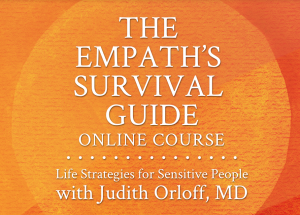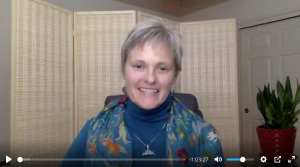 As a teacher of interspecies communication, I find that many empathic and highly sensitive people are drawn to my classes and training programs, and we often talk about these characteristics and the particular ways they impact our lives in our class meetings and online conversations.
As a teacher of interspecies communication, I find that many empathic and highly sensitive people are drawn to my classes and training programs, and we often talk about these characteristics and the particular ways they impact our lives in our class meetings and online conversations.
I’ve written about the blessings and challenges of being both an empath and a highly sensitive person, and some of the tools that I’ve found helpful in learning to live in a world that I am often overwhelmed and baffled by. (See Tools for Empaths Part 1 and Tools for Empaths Part 2).
Often, people who are highly empathic and sensitive are naturally drawn to animals, plants, trees, rocks, and quiet, wild places. I was thrilled to find the research by Dr. Elaine Aron that suggests that the trait of high sensitivity is found in 15-20% of all species studied…from insects to horses, birds, dogs, fish. This helps us to understand a lot about the innate, natural variations in our biology, psychology, and nervous systems.
 My Afghan hound Tashi Joy shares these trait, and has taught me so much about living with high sensitivity in a canine body. She observes, senses, feels, and experiences everything deeply…and, similar to me, she’d often prefer her
My Afghan hound Tashi Joy shares these trait, and has taught me so much about living with high sensitivity in a canine body. She observes, senses, feels, and experiences everything deeply…and, similar to me, she’d often prefer her throne sofa to being out in the world. 🙂
I’m always on the lookout for helpful information to share with my clients and students who share these traits and sometimes struggle to know how to live in a world that seems designed to overwhelm us.
Here are some resources that have been personally very helpful for me in learning to thrive in the world as an empath and highly sensitive person.
Dr. Judith Orloff
Dr. Judith Orloff is a psychiatrist, author, and intuitive, who is transforming the medical world with her integration of intuition and spirituality in psychiatric medicine.
Dr. Orloff’s books, courses, and online videos and blog posts are a tremendous resource for empaths, highly sensitive people, and those who love us (or want to love us, but are baffled by our oddities.)
The Empath’s Survival Guide Online Course
This online course, offered by Sounds True, is an excellent guide to living as an empath, with practical, helpful tools and advice for not only thriving in our world, but offering our gifts in the fullest way possible.
Dr. Orloff says:
I call this course a “survival guide,” but survival is only the first step. Your gifts are needed so much today. Many of our greatest challenges arise from our cultural training to be constantly afraid, isolated, and numbed into insensibility.
Empaths and sensitive people are pioneers on the forefront of a new way of being for humankind.
Learn more about the Empath’s Survival Guide Course here.
I also highly recommend the following books by Dr. Orloff:
Thriving As An Empath: 365 Days of Self-Care for Sensitive People
The Empath’s Empowerment Journal: Your Self-Care Companion
The Empath’s Survival Guide: Life Strategies for Sensitive People
The Ecstacy of Letting Go: Surrender Practices to Empower Your Life
Emotional Freedom Practices: How to Transform Difficult Emotions into Positive Energy
Positive Energy Practices: How to Attract Uplifting People and Combat Energy Vampires
Dr. Elaine Aron
Dr. Aron began the study of the innate temperament trait of high sensitivity in 1991. Her website, books, and research are a wealth of information for people with the trait, as well as for those who love them.
Dr. Aron says:
If you find you are highly sensitive, or your child is, I’d like you to know the following:
- Your trait is normal. It is found in 15 to 20% of the population–too many to be a disorder, but not enough to be well understood by the majority of those around you.
- It is innate. In fact, biologists have found it in over 100 species (and probably there are many more) from fruit flies, birds, and fish to dogs, cats, horses, and primates. This trait reflects a certain type of survival strategy, being observant before acting. The brains of highly sensitive persons (HSPs) actually work a little differently than others’. To learn more about this, see Research.
- You are more aware than others of subtleties. This is mainly because your brain processes information and reflects on it more deeply. So even if you wear glasses, for example, you see more than others by noticing more.
- You are also more easily overwhelmed. If you notice everything, you are naturally going to be overstimulated when things are too intense, complex, chaotic, or novel for a long time.
- This trait is not a new discovery, but it has been misunderstood. Because HSPs prefer to look before entering new situations, they are often called “shy.” But shyness is learned, not innate. In fact, 30% of HSPs are extroverts, although the trait is often mislabeled as introversion. It has also been called inhibitedness, fearfulness, or neuroticism. Some HSPs behave in these ways, but it is not innate to do so and not the basic trait.
- Sensitivity is valued differently in different cultures. In cultures where it is not valued, HSPs tend to have low self-esteem. They are told “don’t be so sensitive” so that they feel abnormal.
I highly recommend these books by Dr. Aron:
The Highly Sensitive Person: How to Thrive When the World Overwhelms You
The Highly Sensitive Person’s Workbook
I’ve learned that if I take care of myself, honor my sensitivities, and create a life that nourishes and supports me, I can share the gifts that my sensitivity and empathy offer in the world without feeling drained, stressed, and overwhelmed. It’s a process, and requires a certain kind of day-to-day vigilance.
The blessings are many, including being able to feel and understand the multi-layered, multi-dimensional nuance and beauty of the world that, despite the violence, chaos, and suffering that surrounds us, can astonish us with its grace, its poetry, its brilliance.
You may also be interested in:
Ethics and Energetic Boundaries Open Access Course


